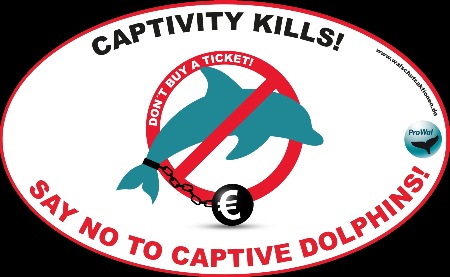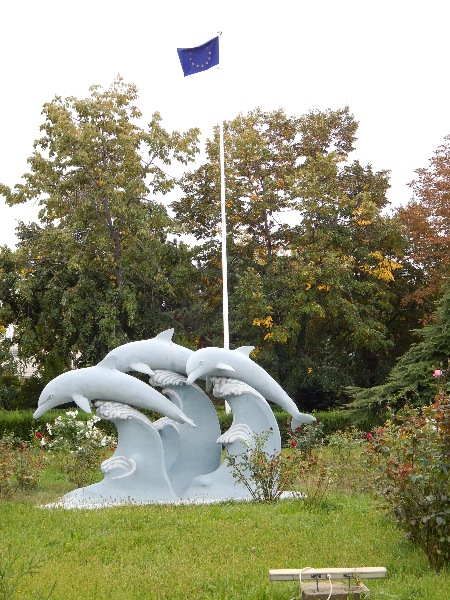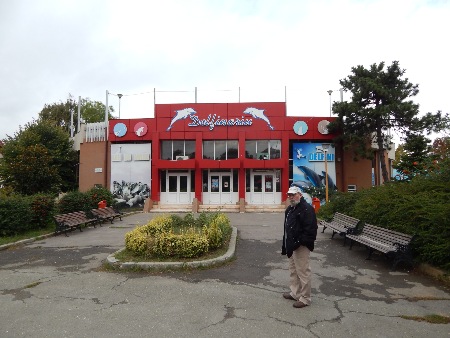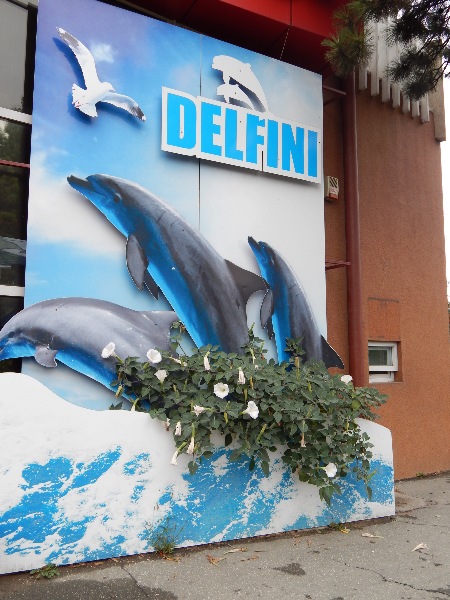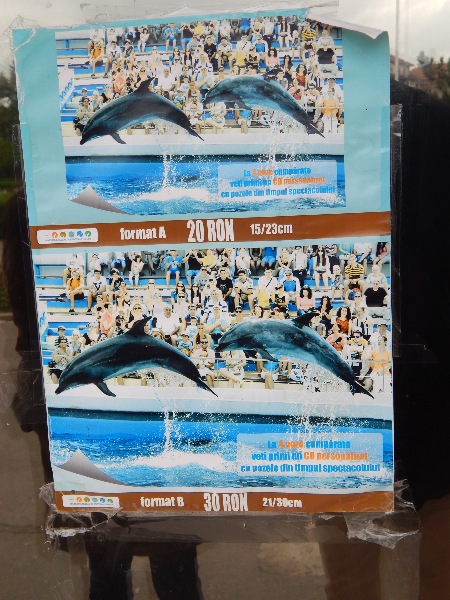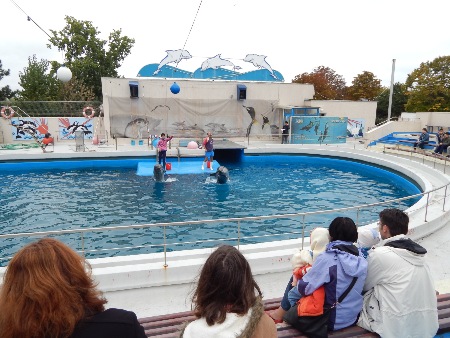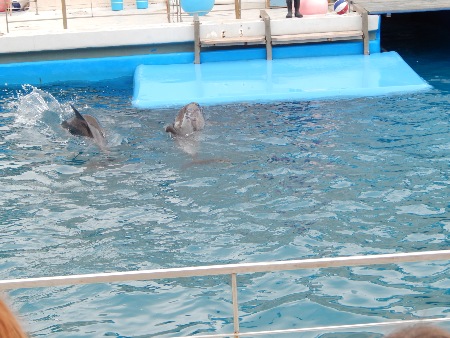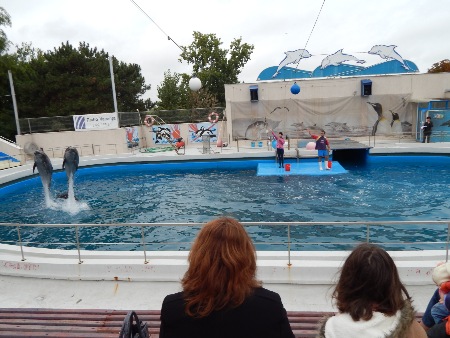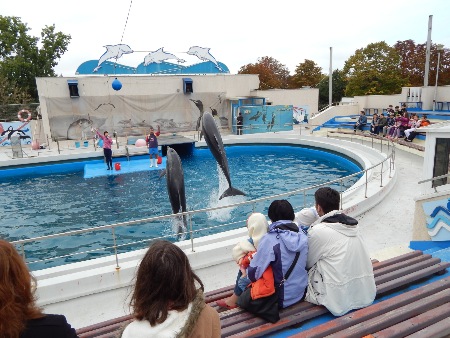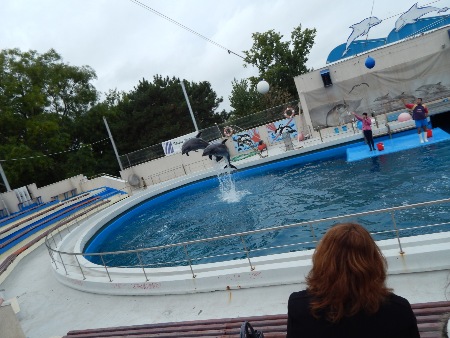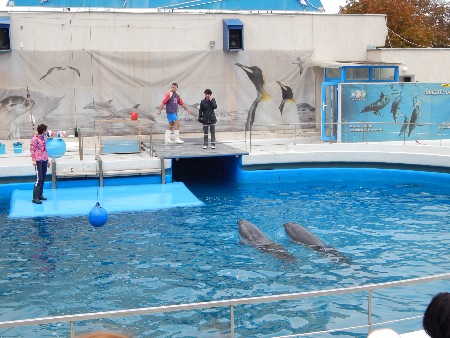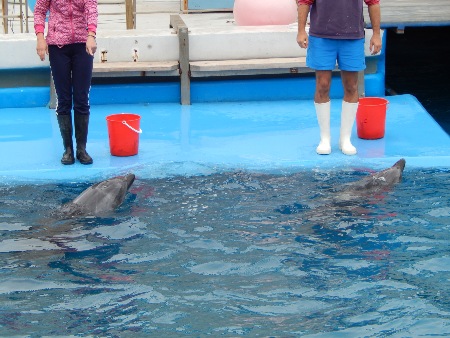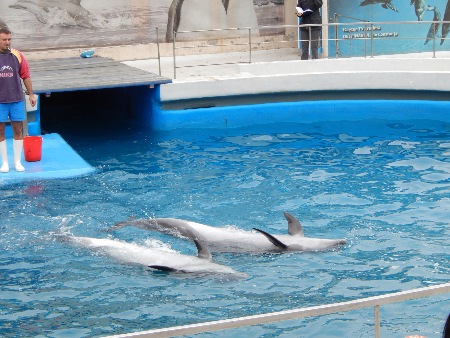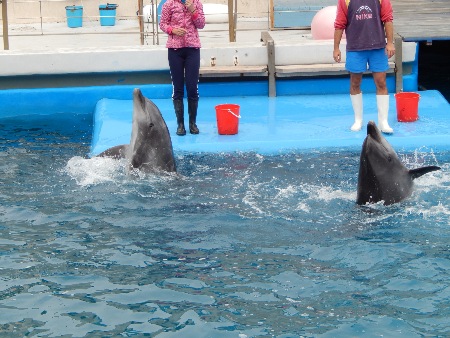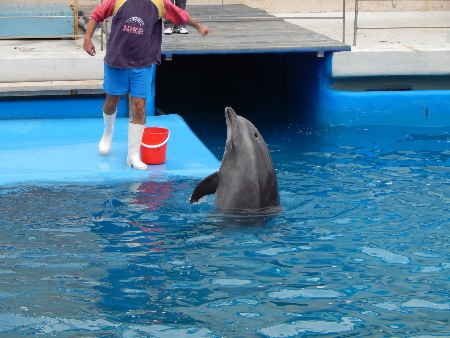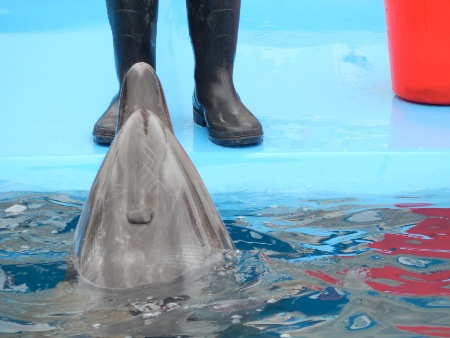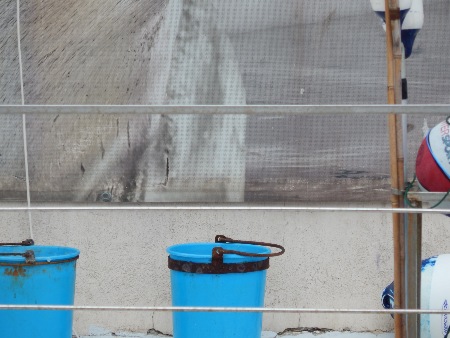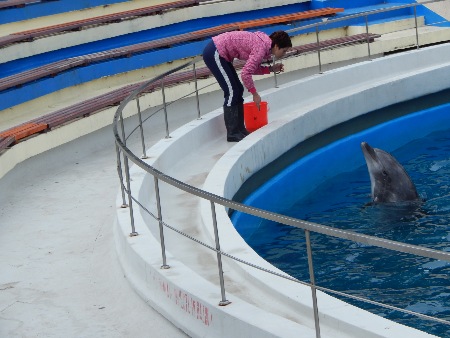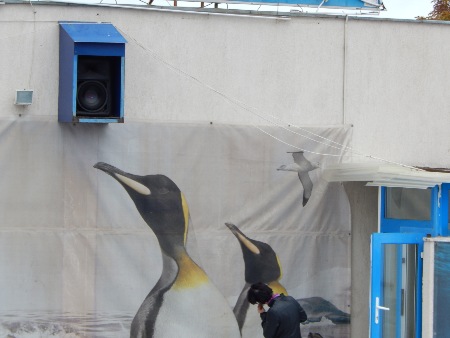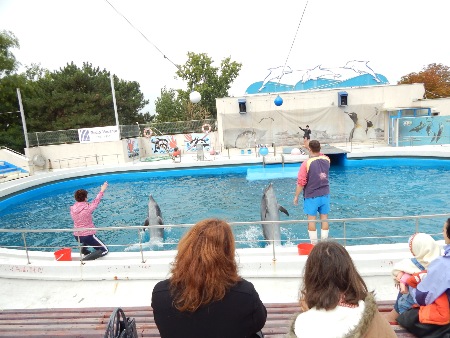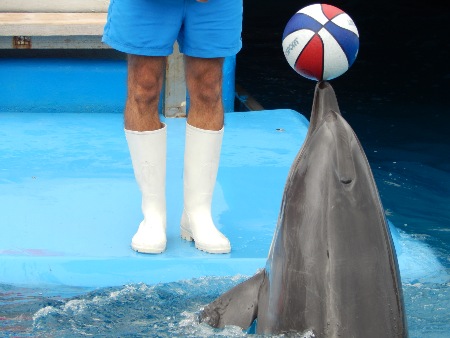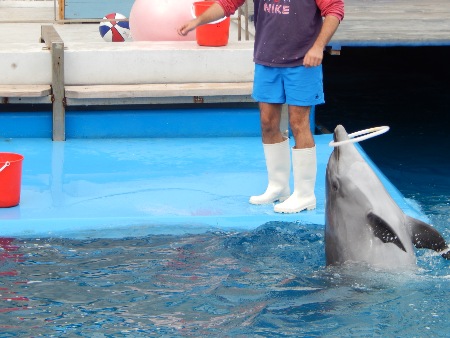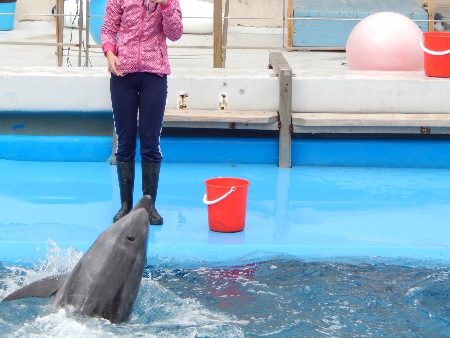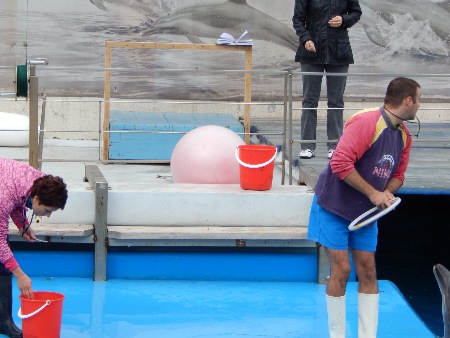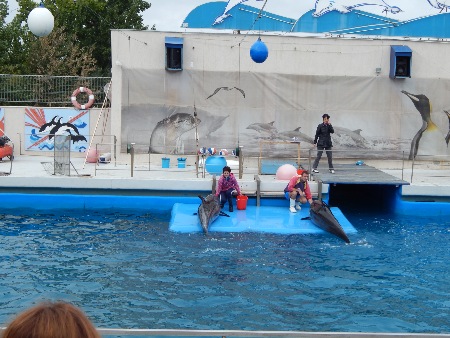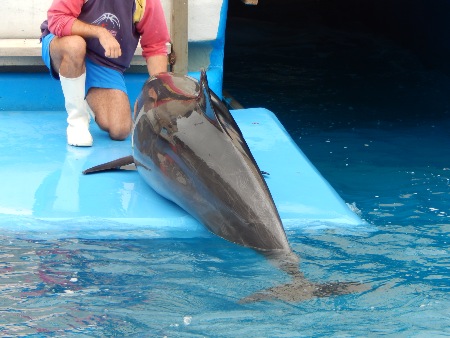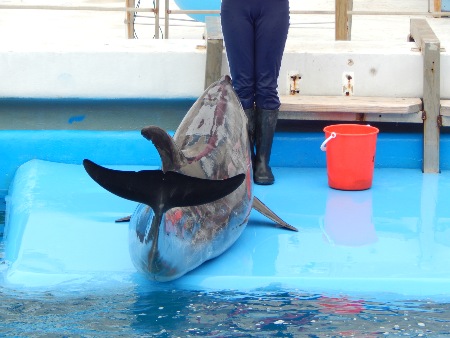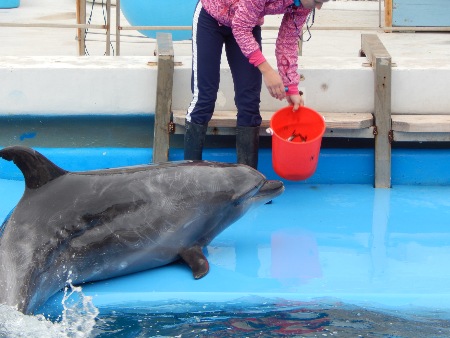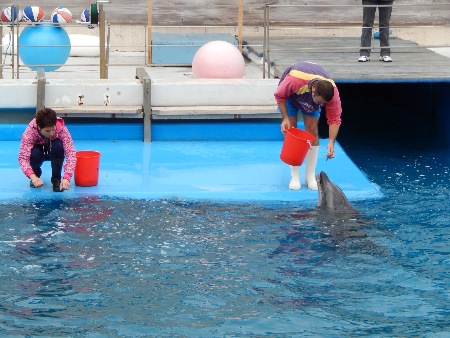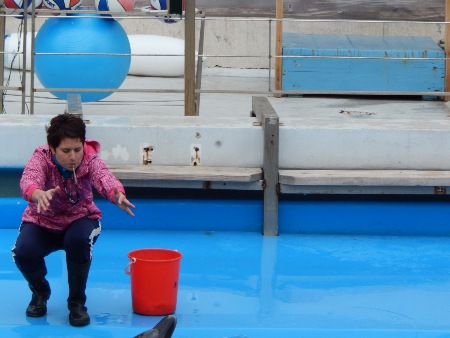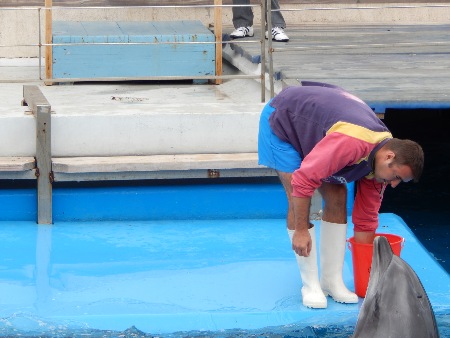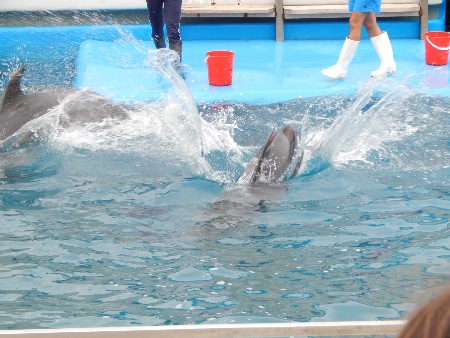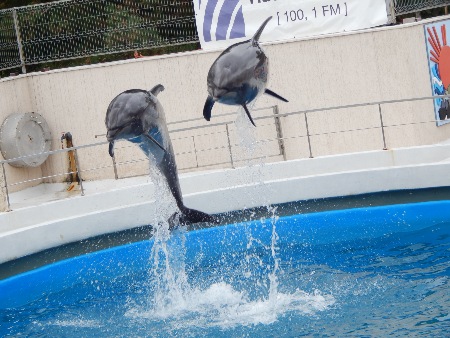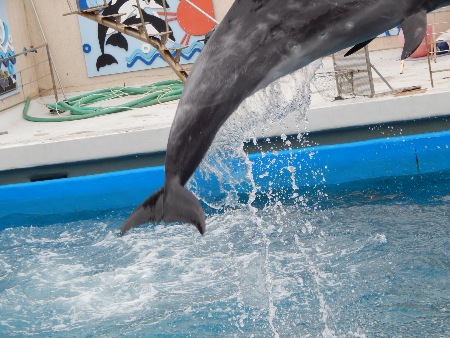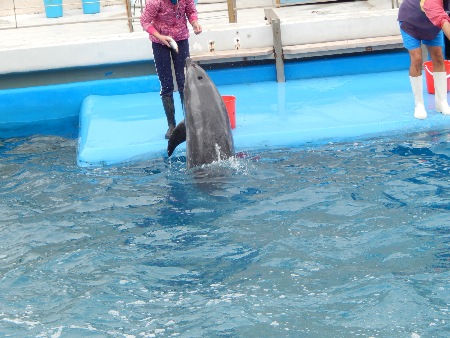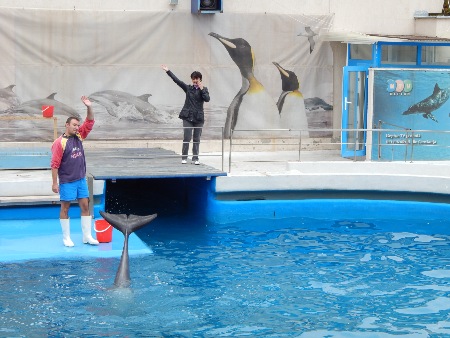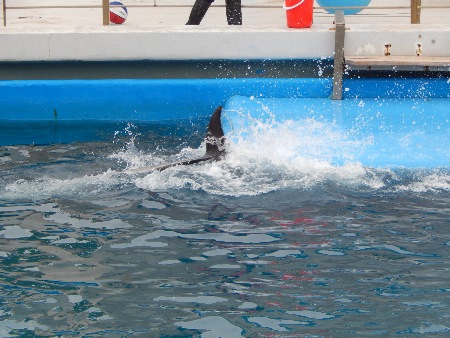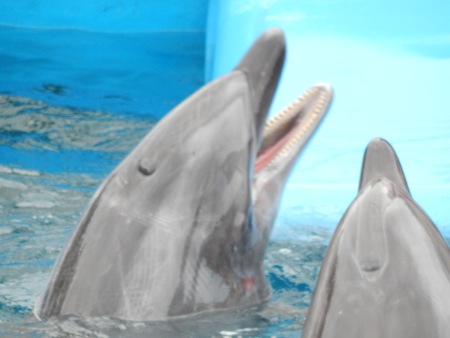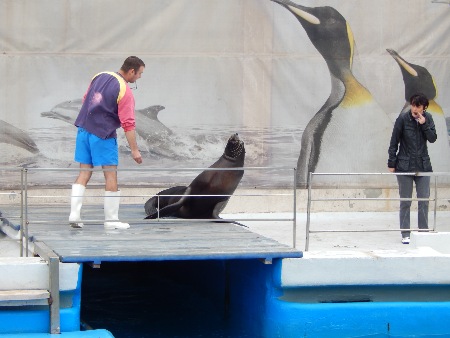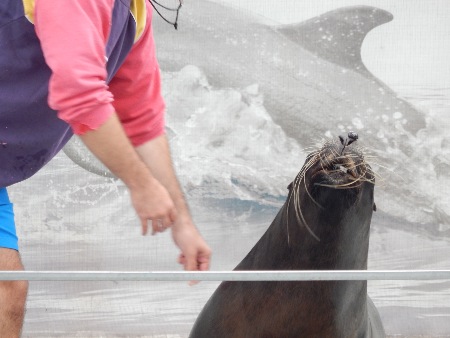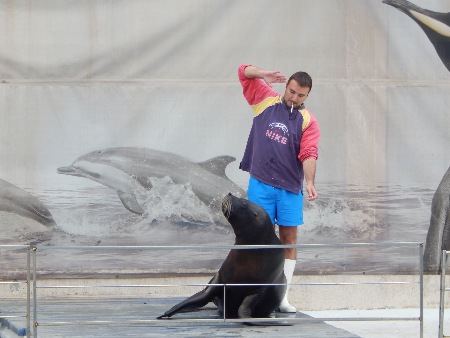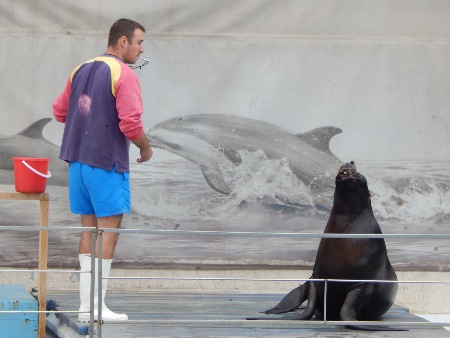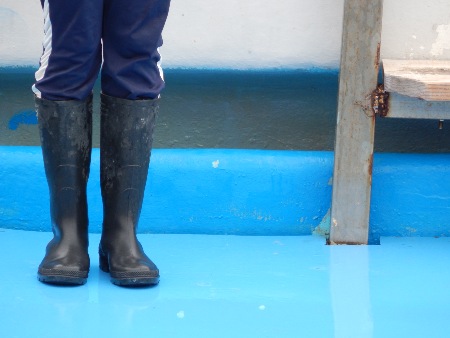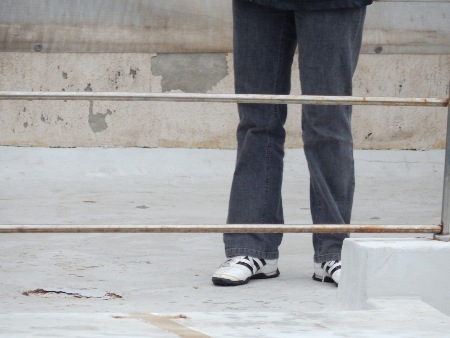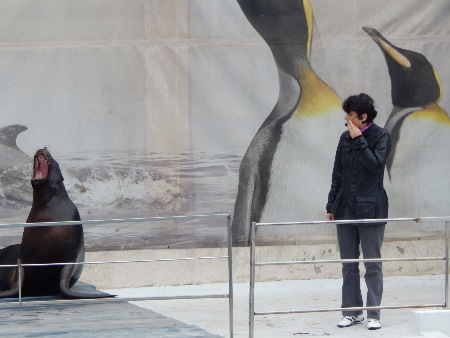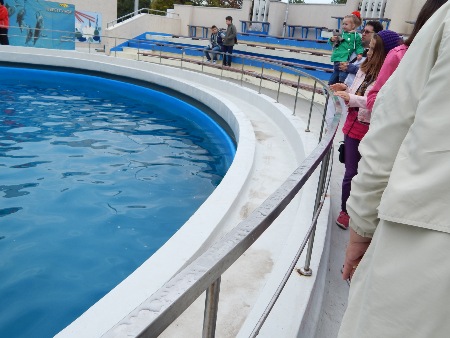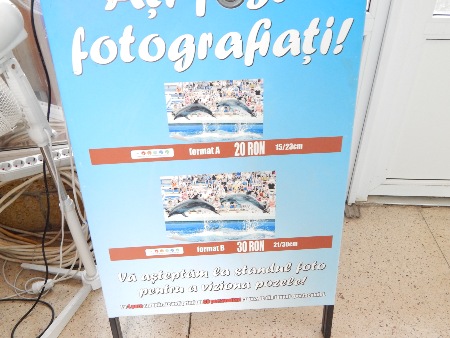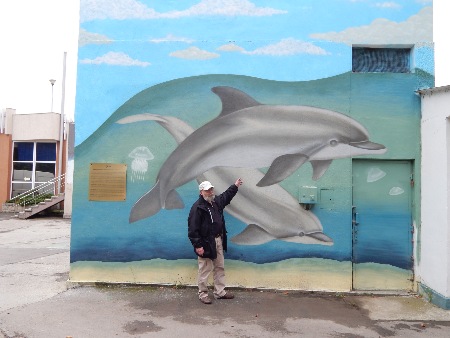

|


Constanta am Schwarzen Meer
DELFINARIU CONSTANTA
B-dul Mamaia nr. 255
Constanta
http://www.delfinariu.ro/en
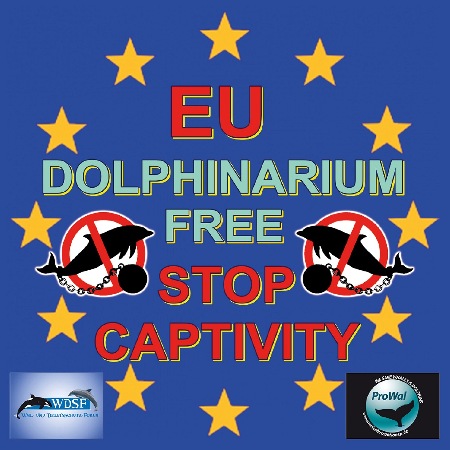
Aus Tierschutzgründen - Helfen Sie den Delfinen und
kaufen Sie keine Eintrittskarten für Anlagen, in denen Meeressäugetiere in
Gefangenschaft gehalten werden!
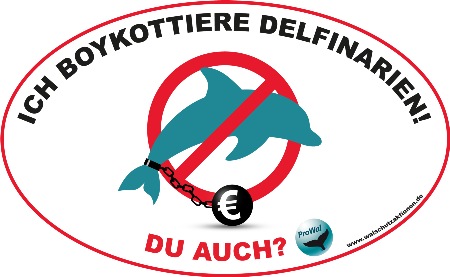
25.04.17 - Ängstliche Vorkehrungen im Delfinarium in Constanta in Rumänien!
Weil gerade das rumänische Parlament über eine Gesetzesvorlage berät, die beinhaltet, dass die Verwendung von Wildtieren in Zirkussen verboten werden solle, änderte das Delfinarium in Constanta an der rumänischen Schwarzmeerküste nun ganz schnell sein Show-Programm.
Fortan sollen die Delfine keine albernen Kunststücke, wie mit dem Ball jonglieren oder durch Reifen springen, mehr vorführen.
Die Betreiber fürchten wohl den Verlust ihrer Lizenz, falls ein solches Gesetz verabschiedet werden sollte und wenn sie ihre abartige Show mit Delfinen fortsetzen würden!
Das Delfinarium kaufte, nachdem alle seiner Delfine verstarben, in 2010 für 500.000 Euro drei Delfine vom Zoo in Peking. Angeblich wären diese Tiere Nachzuchten gewesen, woran aber zu zweifeln ist. China ist mittlerweile der größte Importeur von wildgefangenen Delfinen aus Taiji/Japan, weil das Land durch den riesigen Boom an Neubauten von Delfinarien den Bedarf an Delfinen schon längst nicht mehr durch eigene Nachzuchten decken kann.
Das Delfinarium in Constanta machte schon in der Vergangenheit mit negativen Schlagzeilen auf sich aufmerksam.
In 2016 wurde dieses Delfingefängnis mit EU-Steuergeldern von etwa 900.000 Euro aus einem EU-Strukturfond ausgebaut! ProWal und das WDSF intervenierten daraufhin bei der EU und der EU-Parlamentarier Stefan B. Eck (MdEP) sagte uns seine Unterstützung zu. Er hat bereits reagiert und Anfragen an die Kommission gestellt. Zusammen wollen wir verhindern, dass diese Praxis, die mehr als skandalös ist, zukünftig nicht mehr möglich ist.
Medienbericht:
http://www.romania-insider.com/no-acrobatic-performances-constanta-dolphinarium/?utm_content=buffer5f7e5&utm_medium=social&utm_source=facebook.com&utm_campaign=buffer
07.09.16 - Skandal –Delfinarium in Constanta/Rumänien wurde mit EU-Steuergeldern von etwa 900.000 € aus einem EU-Strukturfondausgebaut!
Nachdem auch der Um- und Ausbau des Delfinariums in Klaipeda/Litauenüber einen EU-Strukturfond mitfinanziert wurde, werden wir nun bei der EU-Kommissiongegen diese skandalösen Beihilfen intervenieren, damit diese Ausbeutung vonDelfinen in Gefangenschaft nicht weiter mit EU-Steuergeldern unterstützt undzukünftig unterbunden wird!
PRESSE-MITTEILUNG -
ProWal - 04.05.2016
Tierschützer kontra
Delfinarien – EU-Parlament soll helfen
Mit
einer Demonstrationstour durch sieben europäische Länder vor 19 Delfinarien
wollen Tierschützer der deutschen Tierschutzorganisation ProWal jetzt auf das
Leid von Delfinen in den 30 Show-Delfinarien in der EU aufmerksam machen und
diese letztendlich schließen. Sie setzen dabei auch auf die Unterstützung des
EU-Parlamentes in Brüssel.
Die
vierwöchige Demonstrationstour startet am 7. Mai in Deutschland und führt über
Italien, Frankreich, Spanien, Portugal und Holland bis nach Belgien. Sie endet
am 4. Juni mit einer Abschluss-Kundgebung vor dem Europäischen Parlament in
Brüssel.
ProWal
bemängelt nicht nur, dass den Meeressäugetieren in den Delfinarien viel zu
wenig Platz zur Verfügung steht, sie dort ihre natürlichen Bedürfnisse nicht
ausleben können, die Tiere durch den toten Fisch, den sie zum Fressen bekommen
oftmals ihren eigenen Flüssigkeitshaushalt nicht ausgleichen können, sondern
auch, dass die Tiere in einem Wasser leben müssen, welches chemisch mit Chlor
oder Ozon aufbereitet wird.
Andreas
Morlok, Geschäftsführer von ProWal: „In dieser Chemiebrühe können nicht einmal
Fische überleben! Obwohl schwerwiegende gesundheitliche Risiken wie
Dehydratation, Augen-, Haut- und Lungenprobleme längst bekannt sind, ist der
Einsatz von Chlor und Ozon für die Wasseraufbereitung in fast allen Delfinarien
gängige Praxis! Das muss nun endlich europaweit gesetzlich verboten werden!“
Nach
Angaben von ProWal führten Interventionen von Tierschützern letztes Jahr dazu,
dass die Regierung der Ukraine als erstes Land der Welt ein Gesetz beschlossen
hat, welches die Nutzung von Meerwasser in den Delfinarien vorschreibt! Ein
Neubau eines Delfinariums erhielt keine Betriebsgenehmigung, weil es diese
Auflage nicht erfüllen konnte.
Jürgen
Ortmüller, Geschäftsführer des deutschen Wal- und Delfinschutz-Forum (WDSF),
welcher die Kampagne von ProWal unterstützt, sieht die Delfinarien ohnehin im
Zugzwang: „Eine Anlage, die eine Gesetzesvorgabe für die Meerwassernutzung
nicht umsetzen kann, soll sich an der Errichtung einer betreuten Meeresbucht
beteiligen, in dem die Tiere verhaltensgerechter untergebracht werden können.
Die Errichtung eines solchen Sanctuary scheint ohnehin unumgänglich zu sein,
denn nach den Schließungen von etwa 50 Delfinarien in West-Europa ist es
mittlerweile eng in den verbliebenen Delfinarien geworden. Obwohl das
Delfinarium in Finnland seine Schließung auf dieses Frühjahr angekündigt hatte,
finden die Betreiber ganz offensichtlich keinen geeigneten Platz mehr für eine
geeignete Unterbringung ihrer vier Delfine. Die geplante Schließung wurde
deshalb auf den Herbst verschoben.“
ProWal
und WDSF wollen dem Europäischen Parlament nicht nur die Schadhaftigkeit des
Chemiewassers für die Delfine belegen, sondern auch, dass die immer wieder
vorgetragenen Argumente seitens der Delfinarien-Industrie Bildung, Wissenschaft
und Arterhaltung, um den Betrieb ihrer Anlagen überhaupt noch rechtfertigen zu
können, eine Farce und ein Deckmantel sind, um kommerzielle Interessen zu
verbergen.
Andreas
Morlok: „Die Besucher lernen in der künstlich geschaffenen Welt der Delfinarien
nichts über die Natürlichkeit von Delfinen. Sie erfahren auch nie etwas
darüber, dass schon mehrmals wildgefangene Delfine aus Japan nach Europa
gelangten, obwohl alle Delfinarien diese brutalen und blutigen Treibjagden
offiziell ablehnen. Die wissenschaftlichen Ergebnisse, die in Delfinarien
erzielt werden, sind auf freilebende Populationen nicht übertragbar und damit
wertlos. Mit Arterhaltung haben diese Anlagen in der EU ohnehin nichts zu tun,
denn noch nie wurde von ihnen ein in Gefangenschaft gehaltener Delfin
ausgewildert.
In
Wahrheit stecken hinter jedem Delfinarium rein finanzielle Interessen. Obwohl
es kaum noch Platz für weitere Tiere in den europäischen Delfinarien gibt, wird
weiterhin an der Zucht festgehalten, denn der Handel mit Delfinen ist immer
noch äußerst lukrativ. Wir werden dem Europäischen Parlament auch belegen, dass
ein Delfin, der in Italien geboren wurde, für 366.000 € an ein anderes
Delfinarium abgegeben wurde!
Wir
sind sehr zuversichtlich, dass das Europäische Parlament ein Gesetz beschließen
wird, um die miserablen Haltungsbedingungen für die Delfine zu beenden. Die
ersten Parlamentarier haben bereits ihre Unterstützung zugesagt.“
-----------------
-----------------
Animal rights
activists against dolphinaria – the EU Parliament should help
Animal rights
activists from the German animal welfare organisation ProWal now want to draw
attention to the suffering of dolphins in the 30 show dolphinaria in the EU by
arranging a tour of seven European countries to demonstrate outside 19 of them,
the ultimate aim being to have them closed down. In doing so they are also
relying on the support of the EU Parliament in Brussels.
The four-week
demonstration tour will start on 7th of May in Germany and will pass
through Italy, France, Spain, Portugal and the Netherlands to finish in
Belgium. It will end on 4 June with a final demonstration outside the European
Parliament in Brussels.
ProWal is
complaining not only that the marine mammals are given far too little space in
the dolphinaria, that they are unable to satisfy their natural requirements in
them and that in many cases the animals are unable to maintain their own fluid
balance with the dead fish they are given to eat, but also that the animals are
forced to live in water which is treated chemically with chlorine or
ozone.
Andreas Morlok, managing
director of ProWal: “Not even fish can survive in this chemical soup! Although
serious risks to health, such as dehydration, eye, skin and lung problems have
long been known, the use of chlorine and ozone for water treatment is current
practice in almost all dolphinaria! This must now be prohibited by law for good
throughout Europe!“
According to ProWal
interventions by animal rights activists last year resulted in the government
of Ukraine being the first country in the world to pass a law prescribing the
use of seawater in dolphinaria! No operating licence was issued to build a new
dolphinarium because it could not comply with this law.
Jürgen Ortmüller, managing
director of the German Whale and Dolphin Conservation Forum (WDSF), which
supports ProWal’s campaign, considers that the dolphinaria are under pressure
anyway: “A facility which is unable to implement a legal prescription for the
use of seawater should contribute to the creation of a sheltered bay in which
the animals can be accommodated in a more behaviourally correct manner. The
creation of such a sanctuary seems inevitable in any case because after the
closure of approximately 50 dolphinaria in Western Europe conditions in the
remaining dolphinaria have now become cramped. Although the dolphinarium in Finland announced its closure for
this spring, the operators are quite obviously unable to find more space for
the suitable accommodation of its four dolphins. The planned closure has
therefore been postponed until the autumn”.
ProWal and WDSF not
only wish to demonstrate to the European Parliament the harmfulness of the
chemical water to the dolphins but also the fact that the arguments that are
repeatedly put forward by the dolphinarium industry relating to education,
science and survival of the species in order to justify the operation of their
facilities are a farce and a cover used to conceal commercial interests.
Andreas Morlok: “The
visitors learn nothing about the natural behaviour of the dolphins in the
artificially created world of the dolphinaria, nor are they ever informed that
dolphins which have already been caught in the wild several times came to
Europe from Japan, although all the dolphinaria officially deny these brutal,
bloody dolphin hunts. The scientific results which are obtained in dolphinaria
cannot be transferred to the wild animals and are therefore worthless. In any
case these facilities in the EU have nothing to do with survival of the species
because no dolphin within the EU kept in captivity has ever been released back
into the wild.
In truth what lie
behind every dolphinarium are purely financial interests. Even though there is
hardly any space for more animals in the European dolphinaria, breeding
continues because trading in dolphins is still extremely lucrative. We will
also be providingthe European Parliament with evidence that a dolphin which was
born in Italy was delivered to another dolphinarium for 366,000 €!
We are very
confident that the European Parliament will pass a law to end the miserable
conditions in which the dolphins are kept. The first parliamentarians have
already promised their support”.

Verstrickung mit wildgefangenen Delfinen aus Japan?
2010 - Kauf von drei Delfinen für 500.000 Euro vom Zoo aus Peking.
Three dolphins from China give 1st public show in Constanta, Romania - http://english.peopledaily.com.cn/90001/90783/91324/7070224.html
Nach dem Tod von dem Delfin "Mark" hatte das Delfinarium keinen einzigen Delfin mehr. Zwei Tierärzte aus Japan begleiteten den Transport. http://www.fmprc.gov.cn/chn//gxh/tyb/ywcf/t705929.htm
Alter der Delfine aus Peking im Jahr 2010:
Pippi 7 Jahre alt (m) - angeblich am 09.06.2013 verstorben http://news.xinhuanet.com/world/2013-06/09/c_124841047.htm
Ni Ni und Chen Chen: 4 Jahre alt (w)
http://news.sohu.com/20100717/n273567928.shtml
http://www.fmprc.gov.cn/chn//gxh/tyb/ywcf/t705929.htm

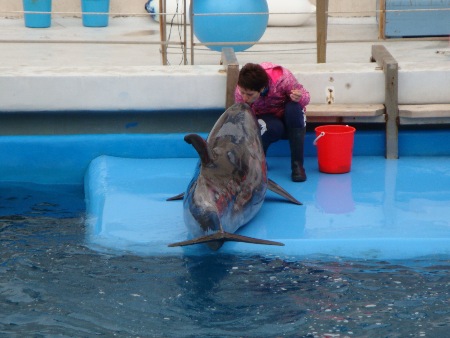
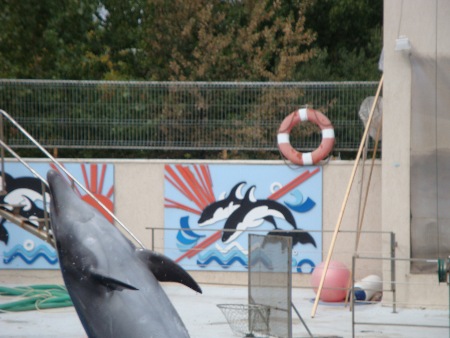
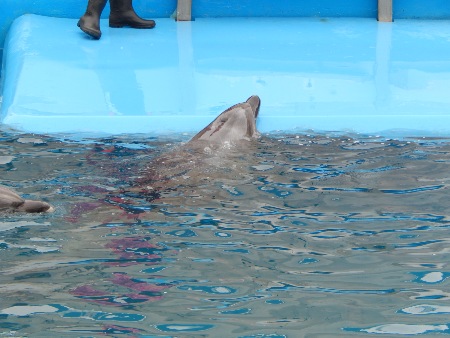
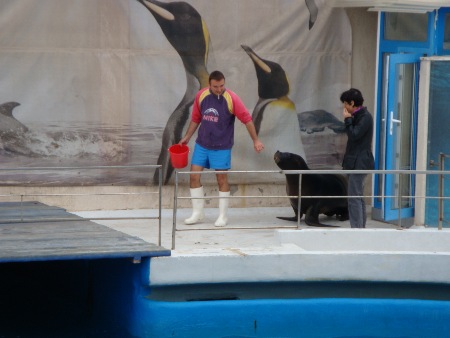
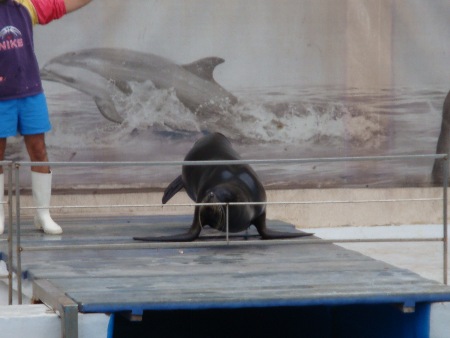
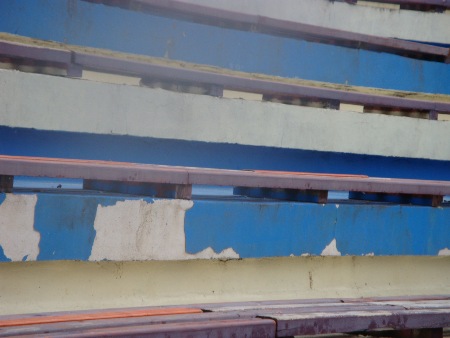

20.12.13
Das Delfinarium soll mit 900.000 Euro des EU-Strukturfonds ausgebaut werden!
Ausbaukosten- 2,8 Mio € - Ein Drittel soll von der EU bezahlt werden - Most of the funding will come from the natural sciences museum – two thirds – and a third from EU money.

17.12.14 - Baupläne: http://www.stylereport.ro/design/noul-delfinariu-din-constanta-ar-putea-pune-romania-pe-harta-arhitecturii-moderne-europene
30.03.14 - Verhöhnung von Delfinen mit dubioser Herkunft – Die EU fördert Ausbau eines Delfinariums in Rumänien mit Steuergeldern!
900.000 Euro Steuergelder gibt die EU über einen Strukturfond für den Ausbau des Delfinariums in der rumänischen Stadt Constanta aus!
Alle Delfine starben, bevor das rumänische Delfinarium im Sommer drei Delfine aus dem Zoo in Peking gekauft hatte. Angeblich seien die Delfine auch China Nachzuchten in 2. Generation! Im Zoo-Delfinarium in Peking sind Nachzuchten sehr selten und es gibt keine Berichte darüber, dass dort überhaupt jemals eine Zucht in 2. Generation gelang! Wir vermuten, dass die Dokumente allesamt gefälscht sind! Der Zoo in Peking gilt als einer der größten Aufkäufer von wildgefangenen Delfinen, die aus den berüchtigten Treibjagden in Taiji stammen!
Einer der drei jungen Delfine in Constanta starb angeblich letztes Jahr. Eine von ProWal/WDSF geforderte DNA-Analyse, um die Herkunft der noch zwei vorhandenen gekauften Delfine aus China, zweifelsfrei bestimmen zu können, lehnen der Betreiber und das zuständige Umweltministerium in Bukarest ab, was sehr tief blicken lässt.
Die Delfinarium-Leitung in Constanta hat angekündigt, bald einen wildgefangenen Delfin aus dem Indischen Ozean nach Rumänien zu importieren. Der Delfin-Import für ein reines Show-Delfinarium in ein EU-Land ist illegal!
http://www.libertatea.ro/detalii/articol/pregatite-show-nini-chen-chen-exercitii-vizitatori-delfinariu-487188.html
Mehr Informationen über das Delfinarium in Constanta unter:
http://walschutzaktionen.de/514601/2184001.html
14.02.14 - Diskussion in Rumänien darrüber, den Delfinen menschliche Rechte zu gewähren - In election year, Romania debates giving human rights to dolphins - http://www.wellandtribune.ca/2014/02/14/in-election-year-romania-debates-giving-human-rights-to-dolphins
19.03.2014
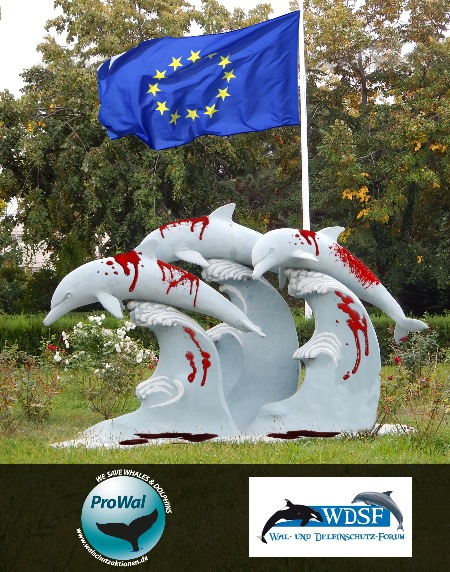
Gibt es bereits Delfine aus Japan in der EU? Europäische Delfinarien blocken
Im Herbst 2013 erreichte eine dubiose E-Mail eines Finanzinvestors aus Rumänien die deutsche Delfin- und Walschutz-Organisation ProWal. Die Anfrage, in der um Mithilfe für den Bau eines neuen Delfinariums in Rumänien gebeten wurde, weckte zuerst das Interesse der Delfinschützer und sorgte dann nach eigenen Recherchen für Empörung.
Andreas Morlok, ProWal-Geschäftsführer: „Der Absender der E-Mail, ein gewisser Herr Popescu aus der rumänischen Stadt Suceava, war sich wohl nicht bewusst, dass wir auf der Delfinschutzseite stehen, die sich für die Schließungen von Delfinarien weltweit einsetzen. Zum Schein gingen wir auf die Anfrage ein und fragten nach, was denn genau geplant sei und woher die Delfine für das neue Delfinarium kommen sollen? Eine Investorengruppe, die viel Geld hätte, würde zuerst einen privaten Pool bauen, damit es einfacher sei, Delfine aus der Ukraine, Russland oder China zu besorgen. Der Delfin-Verkäufer würde alle notwendigen Dokumente beschaffen. Später solle das Delfinarium dann der Öffentlichkeit zugänglich gemacht werden, so die Antwort. Wir waren bestürzt, denn alle drei Länder sind für Zuchterfolge von Delfinen nicht gerade bekannt. Alle diese Länder importieren Delfine aus dem japanischen Fischerort Taiji, das nach der oscarprämierten Dokumentation „Die Bucht“ für seine blutigen Delfin-Treibjagden weltweit bekannt wurde. Da es in Rumänien, das seit 2007 Mitgliedsland der EU ist, bereits schon in 2010 zu dubiosen Delfin-Importen aus Asien kam, begannen wir zusammen mit dem deutschen Wal- und Delfinschutz-Forum (WDSF) umfangreiche Recherchen.“
ProWal reiste im September 2013 nach Constanta am Schwarzen Meer und recherchierte im bisher einzigen rumänischen Delfinarium. Auch wurden die Behörden in Bukarest eingeschaltet.
Andreas Morlok: „In dem winzigen Delfinarium in Constanta lebten nur noch zwei der drei Delfine, die für 500.000,- € von dem Zoo in Peking gekauft wurden. Ein Delfin starb angeblich. Das schon seit 1972 existierende Delfinarium hatte zeitweise überhaupt keine Delfine mehr, denn alle Tiere, allesamt Wildfänge, starben frühzeitig. Laut Aussage des rumänischen Delfinarium-Betreibers seien die drei aus China erworbenen Delfine gar Nachzuchten aus zweiter Generation. In Peking gab es allerdings den ersten Zuchterfolg in 2003. Das Kalb starb. Die Zuchterfolge sind spärlich und es gibt keine Berichte darüber, dass überhaupt eine Zucht in zweiter Generation gelang. Das Zoo-Delfinarium in Peking zählt aufgrund seiner erfolglosen Zuchtbemühungen und großem Bedarf an weiteren Tieren zu den größten Einkäufern für wildgefangene Delfine aus Japan - ebenso die Delfinarien in der Ukraine und in Russland. Auf unsere Forderung von DNA-Analyse-Daten, um die Herkunft der Delfine nachzuweisen, ging weder das Umwelt-Ministerium in Bukarest, noch der Betreiber des Delfinariums in Constanta ein. Wir werden die uns zur Verfügung gestellten Dokumente prüfen lassen, denn die Mutter eines Delfins (Chen-Chen) war ein Wildfang. Es ist davon auszugehen, dass diese Dokumente allesamt gefälscht sind, was bereits auch bei Delfin-Importen aus Japan über die Ukraine nach Ägypten schon einmal der Fall war.“
2013 wurde, laut Angaben von ProWal und dem WDSF, schon einmal versucht, Delfine aus Japan über die Ukraine in die EU nach Tschechien einzuführen, was durch Interventionen verhindert werden konnte.
Jürgen Ortmüller, Geschäftsführer des WDSF: „Importe von Delfinen in die EU für eine überwiegend kommerzielle Nutzung sind verboten. Da die Delfine täglich an den Shows in den Delfinarien teilnehmen, dürften überhaupt keine Importe mehr in die EU zugelassen werden!“
Alle Delfinarien in der EU blockieren
Um den Verdacht auszuräumen, dass sich bereits wildgefangene Delfine aus Japan in der EU befinden, wurden alle 30 Delfinarien von den Delfinschutzorganisationen gebeten, Dokumente und DNA-Untersuchungsberichte für ihre in Gefangenschaft gehaltenen Delfine zur Verfügung zu stellen.
Andreas Morlok: „Nur wenige Delfinarien waren für eine Kooperation überhaupt bereit und stellten uns kaum aussagekräftige Dokumente zur Verfügung. DNA-Analyse-Daten übermittelte keiner, was natürlich tief blicken lässt! Auch das Europäische Erhaltungszuchtprogramm (EEP) für Delfine ist ominös und völlig intransparent. Dieser Zusammenschluss von europäischen Delfinarien stellt überhaupt keine Daten zur Verfügung und arbeitet im Verborgenen. Laut Aussage der Deutschen Bundesregierung von 2010 gibt es gar Delfinarien außerhalb der EU, die diesem EEP angehören. Für Zuchtbemühungen werden andauernd Delfine und auch Fortpflanzungsmaterial zwischen den teilnehmenden Delfinarien hin- und her getauscht.“
ProWal und das WDSF stellten bei ihren Recherchen auch fest, dass die EU über einen Strukturfond den Ausbau des Delfinariums im rumänischen Constanta mit 900.000,- € und den größten Teil der Kosten von 11,5 Millionen € für den Ausbau des Delfinariums in der litauischen Stadt Kleipeda finanziert.
Andreas Morlok: „Diese Unterstützung der EU mit Steuergeldern ist ein Skandal und muss sofort rückgängig gemacht werden. Beide Delfinarien verweigern die zur Verfügungstellung von DNA-Material über ihre in Gefangenschaft gehaltenen Tiere. In Litauen, seit 2004 EU-Mitglied, befinden sich auch wildgefangene Delfine aus dem Schwarzen Meer, die aus dem ukrainischen Sevastopol gekauft wurden. Die Entnahmen von Delfinen aus dem Schwarzen Meer sind durch ein Fang-Moratorium verboten. Es gibt auch Hinweise dafür, dass Delfine mit unbekanntem Ursprung aus Russland nach Litauen gebracht wurden.“
Blamage für deutschen Zoo
In Deutschland gibt es nach acht Schließungen noch zwei Delfinarien in den Zoos der Städte Duisburg und Nürnberg. Duisburg stellte den beiden Tierschutz-Organisationen ProWal und WDSF überhaupt keine Unterlagen zur Verfügung. Beide Delfinarien verweigern auch die Herausgabe von Gen-Analyse-Daten.
Mit einer gewagten Aussage äußerte sich der Zoo in Nürnberg:
„Der Tiergarten Nürnberg, so wie alle anderen europäischen Delfinarien verurteilen das Abschlachten der Delfine und niemals werden Tiere aus Taiji in unsere Delfinarien kommen.“
Jürgen Ortmüller wiederspricht: „Diese Aussage ist falsch, denn es befinden sich bereits Delfine aus Taiji in europäischen Delfinarien. Unter anderem in Russland und in der Ukraine. Anstatt falsche Behauptungen aufzustellen, wäre es der Sache dienlicher, dass alle Delfinarien in der EU mehr Transparenz zeigen würden. Die Zoos in Duisburg und in Nürnberg sind übrigens Mitglieder des Weltzooverbandes WAZA, in der auch der Japanische Zoo-Verband JAZA Mitglied ist. Viele Mitglieder der JAZA, wie unter anderem das Wal-Museum in Taiji, sind aktiv an den grausamen und blutigen Delfin-Treibjagden beteiligt.
ProWal und das WDSF fordern die EU-Kommission auf, ihre Unterstützung für den Ausbau der Delfinarien in Rumänien und in Litauen unverzüglich zu beenden. Zudem müsse ein ausnahmsloses Importverbot für Delfine in die EU beschlossen werden, da weder die Zucht nachhaltig ist, noch Delfine ausgewildert werden und es überhaupt keine Transparenz über die Tiere in den vorhandenen Delfinarien gibt. Die Abschaffung des EEP für Delfine ist ebenso erforderlich, wie ein Zuchtverbot, da dieser Zusammenschluss nur für die Verfolgung kommerzieller Interessen der Delfinarien-Betreiber dient und nicht zum Artenschutz freilebender Delfin-Populationen beiträgt.
22.03.14
Are there already dolphins from Japan existing in the EU? European dolphinariums are blocking inquests.
During fall 2013 a dubious e-mail of a Rumanian financial investor reached the German dolphin and whale protection organization ProWal. The e-mail, which was asking for support in building a dolphinarium in Rumania rang strange and piqued the interest of dolphin protectors and then changed into outrage after more in-depth investigation.
Andreas Morlok, CEO of ProWal, "The sender of the e-mail in question is a Mr. Popescu from the Rumanian town Suceava and was probably not aware of the fact that we are on the opposite side, the side of protecting the dolphins, and we are for closing all dolphinariums worldwide. We pretended to show interest and asked what exactly was being planned and from where the dolphins for the new dolphinarium were coming. A group of investors, who had plenty of money, would initially construct a private pool for facilitating import of dolphins from the Ukraine, Russia or China. The dolphin seller would obtain all the necessary documentation. Later on the dolphinarium would be opened to the public, that was the answer. We were very upset, because all three countries are not known to be very successful for breeding dolphins in captivity. All these countries import dolphins from the Japanese fishing village Taiji, which was exposed to the whole world through the Oscar-winning film "The Cove" as a bloody site for dolphin drive-hunts. Since there were dubious dolphin imports in 2010 from Asia into Rumania, which is a member of the EU since 2007, we started in-depth research in cooperation with the German Whale-and Dolphin-Protection Forum (WDSF)."
ProWal traveled to Constanta on the Black Sea in September 2013 and looked at the up to now single Rumanian dolphinarium. The authorities in Bukarest were also advised.
Andreas Morlok reports: "In the tiny dolphinarium in Constanta were only two dolphins of the original three alive, which were purchased for Euros 500.000 from the Peking Zoo. One dolphin apparently died. The dolphinarium, which had been in existence since 1972, intermittently had no dolphins at all, because all the animals, including wild-caught ones, died prematurely. As per the statement of the Rumanian dolphinarium owner, the three dolphins were purchased from China and were even bred there and were second generation. There was, however, a first time breeding success in Peking in 2003, but the calf died. Breeding successes are sparse and there are no reports that such breeding from the second generation was ever successful. The zoo-dolphinarium in Peking is because of its unsuccessful breeding efforts and its tremendous demand for new animals one of the largest buyers of wild-caught dolphins from Japan - and so are the dolphinariums of the Ukraine and Russia.
Our request for DNA-analysis data, to determine the origin of these dolphins, neither the environmental ministry nor the owners of the dolphinarium in Constanta reacted. We will have the documents, that were made available to us, examined, because the mother of one of the dolphins (Chen Chen) was caught in the wild.
It could be possible that all the documents are counterfeit, which has already happened by dolphins from Japan that were imported via Ukraine into Egypt."
As per reports from ProWal and the WDSF it had been tried before to import dolphins from Japan via the Ukraine into the EU and on to Czechia, which, however, could be prevented.
Juergen Ortmueller, CEO of the WDSF reports: "Imports of dolphins into the EU for commercial use are illegal. Since dolphins are used daily for shows in the dolphinariums there should be no imports allowed at all into the EU."
All the dolphinariums in the EU are quiet.
To clear up the suspicion that there are already Japanese dolphins in the EU, all 30 dolphinariums were asked by the dolphin-protection organizations to produce documents and DNA-analysis reports for their captive dolphins.
Andreas Morlok: "There were only a few dolphinariums willing to show us documentation, which was not even very specific. DNA-analysis documents were not shown at all, which, of course, tells all. Even the European program breeding-for-sustainability (EEP) for dolphins is opaque and not transparent. This cooperative of European dolphinariums does not provide any kind of documentation and works behind the scenes. As per a report published by the German government in 2010 there are no dolphinariums in existence outside the EU that belong to this EEP. For breeding purposes dolphins and even material for procreation are being traded back and forth between the partaking dolphinariums."
ProWal and the WDSF found out through research that the EU has donated Euros 900.000 for construction at the dolphinarium in the Rumanian Constanta as well as has financed the largest part of the 11.5 million Euro cost needed for the construction of the dolphinarium in the Lithuanian town of Kleipeda.
Andreas Morlok has this to add: "This is a scandal that the EU is supporting such construction with tax payers money and has to be reversed immediately. Both dolphinariums are refusing to relinquish any documentation concerning DNA proof of their captive dolphins. In Lithuania, which country has been a member of the EU since 2004, there are also dolphins that were caught in the Black Sea and which were bought from the Ukrainian Sevastopol. Catching dolphins from the Black Sea has been illegal by means of a catch-moratorium. There is also evidence that dolphins from an unknown origin were brought from Russia to Lithuania."
A Disgrace for the German Zoo.
In Germany, after 8 closures, two dolphinariums are still in existence, i.e. in the zoos of the cities of Duisburg and Nuernberg. Duisburg did not show any documentation to the two animal rights organizations ProWal and WDSF. Both dolpphinariums also refuse to publish the genetic analysis data.
A brazen statement from the zoo in Nuernberg:
"The Nurnberg Zoo, as well as all the other European dolphinariums are condemning the slaughter of dolphins and never will any dolphin from Taiji find its way to our dolphinarium".
Juergen Ortmueller disagrees: "This statement is wrong, because there are already dolphins from Taiji in european dolphinariums, as for instance in Russia and in the Ukraine. Instead of giving false assertions it would be more effective that all dolphinariums in the EU would show more transparency. Both zoos in Nuernberg and Duisburg are by the way members of the World Zoo Association WAZA, in which the Japanese Zoo Association JAZA also holds a membership. Many members of the JAZA, as for instance the whale museum in Taiji, are actively participating in the cruel and bloody slaughter of the drive-hunts.”
ProWal and the WDSF are demanding from the EU Commission to immediately stop their support for the construction of the dolphinariums in Rumania and Lithuania. Furthermore an import ban for dolphins into the EU without restrictions should be put in effect, since breeding in captivity is not sustainable and reintroducing the animal back into the wild is not done and there is no transparency about the existing animals in the dolphinariums.
Also, ending the EEP for dolphins is also of utter importance, as well as a ban on breeding in captivity, since this will only be exploited by the commercial interests of the dolphinarium industry and is not done for the protection of the species of dolphin population living in the wild.
===========================
Dolphins illegally in the EU? Dolphinarium owners refusing DNA ananlyses.
The animal protection organization ProWal and the Whale-and Dolphinprotection-Forum (WDSF) are looking for evidence in the dolphinarium in Constanta, town in the EU country Rumania, of their illegal import of dolphins from Taiji/Japan.
None of the 30 dolphinariums in the EU answered when asked about the DNA analysis of the dolphins held in captivity in zoos and pleasure parks, which would have no doubt given insight into the origin of the dolphins. The Washington Species Protection Act (CITES) forbids the import of dolphins for commercial use.
Last September ProWal inspected the dolphinarium in Constanta, Rumania, after the organization was told that dolphins were held there, which came from the brutal drive-hunts in Taiji. Morlok found only two of the original three dolphins, which were bought for Euros 500.000 from a zoo in Peking under the pretense that these were captivity-bred dolphins. He was told that one dolphin had died. The Rumanian dolphinarium owner, furthermore, maintained that these dolphins were second generation. This, however, could time wise not be possible, the dolphin-protection organization replied, since the only successful breeding of a dolphin happened as proven in 2003 and this dolphin calf did not survive.
The dolphin protectors, furthermore, pointed out that there was no documentation of any successful breeding in the second generation ever in Peking.
To the contrary, China, Russia and the Ukraine belong to the group of the largest buyers of dolphins caught in the wild from Japan.
The Rumanian government in Bukarest also refused to hand over documentation regarding DNA analysis and so did the dolphinarium owner in Constanta as well the dolphinariums in Nuernberg and Duisburg. The zoo in Nuernberg exclaimed that there were no dolphins that were caught in the drive-hunts in Japan anywhere in all of Europe.
Juergen Ortmueller, CEO of the WDSF: "This statement is wrong, because there are in the Ukraine as well as Russia imports from Japan. We are missing here transparency from all the dolphinariums in Europe, which are hiding behind their own creation the EEP, so that nobody from the outside can find out what is going on. Even in Duisburg we have to a court order to be able to access the documentation. The legal authorities in Duisburg told the WDSF that the verdict will be handed down in June 2014".
A financial investor from Suceava in Rumania by the name of Popescu, contacted ProWal last fall asking for support to construct a new private dolphin pool, because he stumbled onto our website by searching the internet and was under the impression the ProWal is an organization supporting dolphinariums. After the dolphins had been imported from China, Russia or the Ukraine, the private dolphin tank was going to be opened to the public and bring a nice income. The procuring of import documents would not be a problem he explains. Since none of the named countries has any success in breeding to show, WSDF and ProWal assume that all the dolphins will come from Japan via the other countries into Rumania.
Furthermore, ProWal and WDSF found through their research that the EU is supporting the construction of a dolphinarium in Rumania by dipping into a building fund to the tune of 900.000 Euros and has also footed a major part of the construction cost of 11.5 million Euros of a dolphinarium in the Lithuanian town of Kleipeda.
ProWal and the WDSF demand from the EU to immediately stop the support for the construction of the dolphinariums in Rumania and Lithuania.
Furthermore, a ban without exception should be implemented in the EU since there is a great lack of transparency regarding the origin of the animals in the existing dolphinariums and there is no control over this.
22.03.14
Ausbau des Delfinariums in Constanta - Wildgefangener Delfin aus dem Indischen Ozean soll nach Rumänien gebracht werden - http://ro.stiri.yahoo.com/cas%C4%83-nou%C4%83-pentru-un-alt-delfin-mamiferul-va-162106501.html
23.03.14
Skandale um das Delfinarium in Constanta weiten sich aus!
Nach ProWal/WDSF-Recherchen schalten sich nun auch die rumänischen Medien ein und fordern Aufklärung – EU finanziert Ausbau des Delfinariums in Constanta – Wildgefangene Delfine aus dem Indischen Ozean sollen folgen!
Nach unseren Recherchen im einzigen Delfinarium im EU-Mitgliedsland Rumänien stellten wir fest, dass die uns von den Behörden in Bukarest und des Betreibers der Anlage in Constanta am Schwarzen Meer übermittelten Dokumente über die Herkunft der in 2010 aus China erworbenen drei Delfine unstimmig sind.
Die drei Delfine wurden für 500.000 Euro aus dem Zoo in Peking gekauft und sollen laut Angaben des Betreibers in Constanta gar Nachzuchten in 2. Generation sein, was unmöglich der Fall sein kann! Delfingeburten im Pekinger Delfinarium sind sehr selten und kaum ein Kalb hat dort überlebt. Der Zoo in Peking ist daher einer der größten Aufkäufer von Delfinen aus dem japanischen Taiji!
Es ist sehr wahrscheinlich, dass die Papiere für die drei nach Rumänien verkauften Delfine in China gefälscht wurden! Der Zoo in Peking investierte seine aus Rumänien erhaltenen 500.000 Euro sofort und kaufte sechs weitere wildgefangene Delfine in Taiji!
Eine von uns geforderte DNA-Analyse verweigert der Betreiber des Delfinariums in Constanta! Auch das Umweltministerium in Bukarest blockt. Sie werden Gründe dafür haben! Einer der drei Delfine soll im Juni 2013 verstorben sein. Ob das stimmt oder der junge Delfin an ein anderes Delfinarium in der EU abgegeben wurde, ist unklar.
Bilder und Infos unserer Recherche im Delfinarium Constanta:
http://walschutzaktionen.de/514601/2184001.html
Aktuelle Medien-Berichte in Rumänien:
http://www.ziuaconstanta.ro/english/latest/dolphins-illegally-in-constanta-dolphinarium-owners-refusing-dna-analyses-488453.html
http://www.digi24.ro/Stiri/Regional/Digi24+Constanta/Stiri/Delfinii+din+Constanta+ar+fi+fost+capturati+ilegal
Skandalös: Steuergelder von der EU!
Völlig inakzeptabel ist, dass die EU nun über einen Strukturfond den Ausbau des Delfinariums in Constanta fördert und den größten Teil der Kosten von 11,5 Mio. Euro übernimmt!
Das Delfinarium, welches sich in der Touristenhochburg Mamaia befindet, erweitert damit die Plätze für die Show-Besucher von derzeit 600 auf zukünftige 1.200 Plätze.
Da die Todesrate in diesem Delfinarium enorm hoch ist und die Anlage zeitweise überhaupt keine Delfine mehr hatte, gibt es nun Planungen, weitere Delfine anzuschaffen, die im Indischen Ozean gefangen werden sollen!
http://ro.stiri.yahoo.com/cas%C4%83-nou%C4%83-pentru-un-alt-delfin-mamiferul-va-162106501.html
In die EU dürfen keine Delfine importiert werden, die für überwiegend kommerzielle Zwecke genutzt werden!
Weitere Informationen erhalten Sie unter: DNA-Tests - EU
